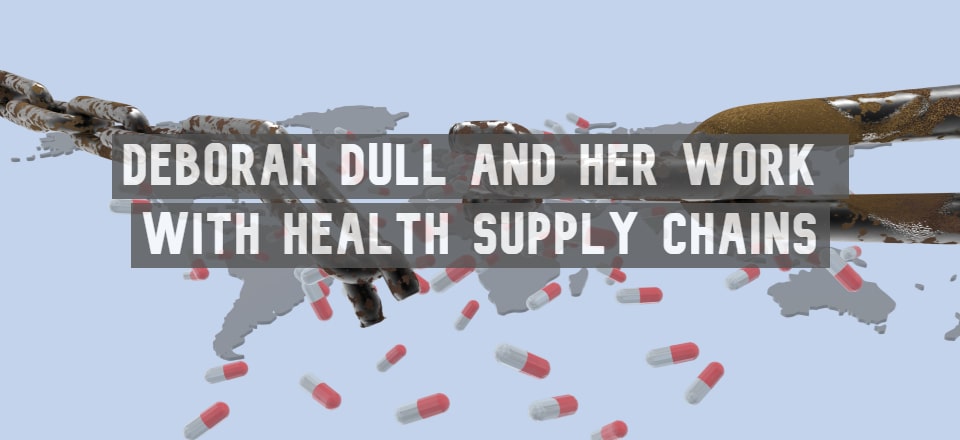We hope you enjoyed viewing Rob’s 2020 video with Deborah Dull on the topic of circular supply chains or reading the transcript of that interview that we published recently. If so, you might be pleased to know that it was only the first of three occasions when Deborah shared her supply chain management insights on the Supply Chain Secrets YouTube channel.
The second of those interviews homed in on health supply chains, particularly those serving third world and developing countries.
So if you’re one of those people who can absorb information more readily by reading, and have an interest in what’s happening in the world of healthcare logistics, the following transcript should be a valuable source of enlightenment for you.
Health Supply Chains Present Complex Challenges
Rob: So Deborah, tell us about your work with the Gates Foundation, particularly in health supply chains.
Deborah: The time I spent with the Gates Foundation was fascinating. The world of international development is complex. So many corporate stakeholders want to help improve the health outcomes of these frontier markets, and when we talk about supply chains, there’s quite a range of topics.
One point of focus explores how to incentivise the large pharmaceutical manufacturers to make generics and lower-cost items that could then be shipped to where they’re needed.
We also have a tremendous challenge around the last mile or even the in-country supply chain. That effectively means anything past a capital city and comprises an entire area of the domestic supply chain.
And there are a couple of key differences that I think are interesting for anybody keen to learn more about this space and maybe even help out. For instance, as supply chain professionals, we tend to make assumptions about what we’ll have access to when solving a supply chain problem.
Challenge #1: Demand Visibility
The first issue, which is the real bummer, is that we have very little information about demand. There are not the networks that we’re used to seeing, and most everything is pen and paper.
These healthcare organisations often diligently record what’s happening, but they file these papers away somewhere in the clinics. They’re kept where they’re needed to be, so we don’t often see very well what’s needed and where it’s needed. But with supply chains’ sole purpose being to meet demand, it becomes challenging to make assumptions and then learn anything back about those assumptions. So that’s one big tough one.
Challenge #2: Underdeveloped Networks
Another challenge is that the idea of a developed network doesn’t exist. So these lanes that we’re used to leveraging in more mature markets aren’t developed yet. Transportation outside of a capital city is typically informal—think, a family with a truck.
Again, very little visibility into where something is. It’s often vital to keep items cold, but it can be a real challenge to ensure that the temperature stays the same all the time. Visibility is a huge one that we’re starting to become more accustomed to in the supply chain, in that we assume we can see items—so that’s a fundamental shift.
Challenge #3: Nurturing Supply Chain Talent
The issue that I focused on quite a bit, though, was around talent. The supply chain industries are not developed, so most universities don’t offer supply chain programs yet. Kenya is a big exception. Most Kenyan universities already offer supply chain programs.
Of course, a lack of support from universities means that there are no locally produced supply chain professionals. Large international companies like Procter and Gamble typically hire financial analysts three years out of school and put them through a two-year internal supply chain program. That’s how they’re developing their talent.
However, I think the only way to make meaningful progress in these geographies is, of course, to have local talent there all the time helping to solve these problems. So I worked with a couple of great organizations to start looking at professional certifications for existing professionals. We also explored how to build an international standard of university programs to train supply chain professionals properly as we go forward.
Putting Africa on the Supply Chain Map
Rob: So has there been much progress on that, particularly in Africa?
Deborah: Before I left, I had put several grants in place. Grants typically are, you know, five years or thereabouts, so they’ll unfold over the coming years, but there were two significant hallmark focus areas. I think one, the Association for Supply Chain Management, started a focus on Africa through their foundation. That’s due to my partnership with them, so I’m pretty excited about that.
I think many large organizations intentionally forget Africa. So, for example, I saw an analysis from one of the big five consultants, and they had the output from every continent, and there was just no number for Africa. And I thought, what a real tragedy.
So I’ve been encouraging the international community to embrace multiple geographies, focus areas, and time zones. The other thing that I’m pretty excited about is working with the Kühne Foundation.
Mr. Kühne from Kuehne Nagel has a foundation investing mainly in education relating to the supply chain. I collaborate with a lovely professor who works for him developing university programs around the world. It’s a fascinating model pairing professors from around the world so that they can help each other avail international opportunities to students and produce very high-quality programs.
Last July, I went to the first graduation of the first three-year program that we launched in Ethiopia. Of course, it’s a long-term investment to build education networks, but we’ll start to see even more graduates this year, so it will continue to be very rewarding.
Improving the Health of Health Supply Chains
It was immensely inspiring to hear how Deborah, as part of her work with the Gates Foundation, has been pioneering the development of health supply chains worldwide.
If you are interested in this niche or are actively involved in managing a health supply chain, I’m sure you will have been as encouraged as Rob O’ Byrne was by Deborah’s passion for the field.
Of course, she is also passionate about other aspects of supply chain operations, especially inventory and its management. In the forthcoming transcript of Rob’s third interview with Deborah, you can read about her thoughts and insights on that topic.
Meanwhile, don’t forget to jump onto our YouTube channel to view the interview from which this transcript is taken, and to catch many more videos full of supply chain insights from the Logistics Bureau team.
Editor’s Note: The content of this post was originally published on Logistics Bureau’s website dated February 8, 2022, under the title “Health Supply Chains: Checking in with Deborah Dull“.









